There is no current scientific basis to claims that on-screen violence leads to acts of real-world violence, like school shootings.
Speaking at a meeting on school safety after the recent high school shooting in Florida, the President suggested that “the internet” and “violent video games” must be “looked at” and argued that violent video games “[shape] young people’s thoughts.”
“We have to look at the Internet because a lot of bad things are happening to young kids and young minds and their minds are being formed, and we have to do something about maybe what they’re seeing and how they’re seeing it,” Trump said. “And also video games. I’m hearing more and more people say the level of violence in video games is really shaping young people’s thoughts.”
Trump also attacked movies:
“You see these movies, and they’re so violent. And yet a kid is able to see the movie if sex isn’t involved, but killing is involved, and maybe they have to put a rating system for that.”
Both the left and right have tried to link acts of real-world violence to video games and other forms of on-screen violence over the past few decades. But there is little scientific evidence to show that on-screen violence leads to violence in the real world.
Studies have shown that on-screen violence does create a desensitization effect, but attempts to show a corresponding drop in personal empathy towards others have not been successful. A recent study in Frontiers in Psychology found no link, nor did a recent study in Brain Imaging and Behavior.
The research on links between video games and aggression is divided. A team of researchers at Oxford found that online, team-based video games can actually improve the sociability of children, and that small amounts of gaming reduced aggression.
Other studies have found weak correlations between competitive video games and aggression but were unable to show that the aggression was caused by the video games as opposed to competition. There is considerable research which shows that competition of any kind leads to aggression. In other words, the aggression studies have yet to show a problem with video games in particular.
One study which did purport a link between video games and violence was retracted by its publisher after data irregularities within the study were found.
Across society, there is no correlation between the rise of on-screen violence. There is considerably more violent media available today than there was in the mid-20th century when movies were tightly censored by the Hays Code, which prohibited gratuitous displays of bloodshed. Video games – violent and otherwise – are a new medium, only gaining traction in the late 70s and 1980s. Yet real-world violence in the developed world has declined across the same period.

The American Psychological Association (APA) categorizes violent video games as a risk factor in causing aggression but found no evidence linking them to acts of real-world criminality or delinquency. Aggression, which is also caused by competitive sports, is not sufficient to lead to real-world violence. In 2017, the Media Psychology and Technology division of the APA has advised public officials and journalists against attempts to link violent media to acts of real-world violence.
“Efforts to “link” violent crimes to violent video games and other media may persist due to a well-known phenomenon called “confirmation bias” or the tendency to pay attention only to information that confirms prior beliefs and ignore that which does not” said the statement.
“As such, when a perpetrator is a young male, news media and policy makers often pay extraordinary attention to their media habits.”
“However, when a perpetrator is an older male or, more rarely, a female, the issue of media violence is typically ignored.”
You can follow Allum Bokhari on Twitter, Gab.ai and add him on Facebook. Email tips and suggestions to allumbokhari@protonmail.com. Charlie Nash is a reporter for Breitbart Tech. You can follow him on Twitter @MrNashington, or like his page at Facebook.

COMMENTS
Please let us know if you're having issues with commenting.